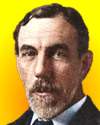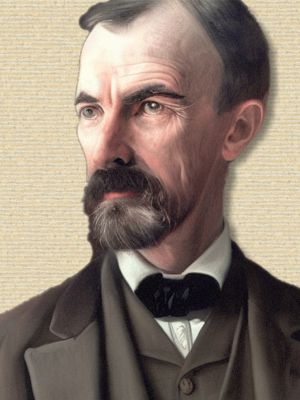 (source)
(source)
|
Sir William Ramsay
(2 Oct 1852 - 23 Jul 1916)
Scottish chemist who was awarded the 1904 Nobel Prize in Chemistry for his “discovery of the inert gaseous elements in air.”
|
THE EARLY DAYS OF CHEMISTRY
by William Ramsay
Collected in Essays Biographical and Chemical (1909)
[p.1] In the early days of the world’s history, the study of science was unknown. The state of society was insecure; nation was constantly invading nation, and men had little leisure for other pursuits save war and the chase. Yet we find, among those nations which were sufficiently powerful to resist the attacks of their neighbours, and sufficiently prosperous to dispense with invasions of the territory of others in quest of plunder, some attempts to inquire into the mysteries of nature. In some countries, as in Egypt, a leisured class of persons, the priests, urged no doubt partly by a desire for knowledge, partly by a wish to impress the people with a sense of their superior powers, made some progress in what may be called ‘natural philosophy,’ understanding by that term elementary physics and chemistry. To these they added a considerable acquaintance with astronomy and mathematics.
For practical purposes of life, too, certain of the arts, notably metallurgy and dyeing, which are based on chemical principles, were cultivated. But these were carried on by rule of thumb, and their development was slow. Indeed, they were for the most part in the hands of slaves, the freemen finding it more profitable to engage in commerce, or in administration. The state of Turkey or Morocco, in the present day, gives a good [p.2] idea of the condition of life in the centuries before the Christian era, in so far as pursuit of science is concerned. Even with the example of adjoining nations, whose prosperity is in great part due to the attention they have paid to the cultivation of scientific knowledge, the Turks and the Moors display a total lack of interest. Much less, then, could people such as those be expected to show any eagerness in the discovery of Nature’s secrets.
Yet from time to time there have been minds who refused to accept the daily drudgery of life as sufficient for their needs. Questions such as: Whence did this world arise? What does it consist of? What will be its ultimate fate ? perplexed them, as they perplex us; and in an endeavour to answer questions like these, scientific discovery was begun. Many nations, however, were instructed by the priests of their religion that it is impious to make such inquiries; and it is not until the era of the early Greek civilisation, when the current mythology had ceased to retain its hold on abler minds, that we find any serious attempt to grapple with fundamental problems like those stated. But even among the Greeks we meet with a disinclination to take trouble about matters which were imagined to have little if any relation to human affairs; even Socrates, one of their greatest thinkers, taught that it was foolish to abandon those things which more nearly concern man for things external to him. Plato, who chronicled the sayings of Socrates, wrote in the seventh book of the Republic: ‘We shall pursue astronomy with the help of problems, just as we pursue geometry; but if it is our desire to become acquainted with the true nature of astronomy, we shall let the heavenly bodies alone.’ And he states in another place, that even if we were to ascertain these things, we could neither alter the course of the stars, [p.3] nor apply our knowledge so as to benefit mankind. And in Timaeus, Plato remarks, ‘God only has the knowledge and the power which are able to combine many things into one, and to dissolve the one into the many. But no man either is, or ever will be, able to accomplish either the one or the other operation.’
Even in the middle ages, the same spirit of content with insufficient observation, and the same disposition to draw conclusions from insufficient premises, is to be noticed. It is difficult for us, in this age when a certain acquaintance with scientific methods of thought, if not with scientific facts, is common to almost every one, to imagine the kind of reply to elementary questions which satisfied our predecessors, even those who devoted time and, one would hope, some powers of mind to a consideration of the subject. Let us take a few examples.
The answer which one of the schoolmen would give to the question: ‘Of what are bodies composed?’ is thus paraphrased by Le Febure, apothecary to His Majesty Charles the Second: ‘If the substance is a body, it must possess quantity; and of necessity, it must be divisible; now, bodies must be composed either of things divisible, or indivisible, that is, either of points, or of parts: a body, however, cannot be composed of points, for a point is indivisible, possessing no quantity, and, consequently, it cannot communicate quantity to a body, since it does not itself possess it. Hence it must be concluded that a body must be composed of divisible parts; to this, however, it may be said that such parts must either be divisible or indivisible; if the former, then the part cannot be the smallest possible, since it may itself be divided into others still more minute; and if this smallest part is indivisible, the same difficulty confronts us, for it will be without quantity, which, therefore, it cannot communicate to a body, for it itself does not possess it, [p.4] seeing that divisibility is the essential property of quantity.’ The logic is unanswerable, but we are left where we were.
Let us next see what ideas were held by Du Clos, physician to Louis XIV., on the cause of the solidification of liquids. These are his memorable words:
‘The reason of the concretion of liquids is obviously dryness; for this quality, being the opposite of moistness, which renders bodies liquid, may well produce an effect opposite to that produced by the latter, to wit, the concretion of liquids.’ Again, we have not gained much information by the profound utterance.
One more quotation. It is from a work by Jean Rey, Doctor of Medicine, published in 1630, entitled, ‘On an Inquiry wherefore Tin and Lead increase in Weight on Calcination.’ He is arguing that ‘Nature abhors a vacuum,’ a favourite thesis in former days. ‘It is quite certain that in the bounds of nature, a vacuum, which is nothing, can find no place. There is no power in Nature from which nothing could have made the universe, and none which could reduce the universe to nothing: that requires the same virtue. Now the matter would be otherwise if there could be a vacuum. For if it could be here, it could also be there; and being here and there, why not elsewhere? and why not everywhere? Thus the universe could reach annihilation by its own forces; but to Him alone who could make it is due the glory of compassing its destruction.’
We must remember, therefore, in studying the early history of chemistry, that not only were facts, familiar to many of us now, wholly unknown; but we must also bear in mind that the point of view from which the early chemists surveyed the phenomena of nature was entirely different from that to which we are now accustomed. It is evident, from the examples quoted, which are not [p.5] taken from the writings of those who lived at a very remote time from the present day, but only six or seven generations ago, that our great-great-great-grandfathers differed from ourselves not merely in lack of knowledge, but in the way they regarded the facts which they observed. And it is consequently somewhat difficult for us to adopt their point of view, and to think their thoughts. But we must attempt to do so, if we are to realise the progress of our science.
The progress of the science of Chemistry, indeed, forms one phase of the progress of human thought. The ideas which have been held, however, run in certain channels. They may all be referred to speculations on the nature of matter; but the speculations take different forms. For it may be inquired: What forms is matter capable of assuming? Or, what is the minute structure of matter? Or, what changes does matter undergo? These three questions were for the ancients, as they are still for us, fundamental; and it will be the aim of these essays to endeavour to give the reader some idea of the history of these three lines of thought. We shall see that our present knowledge enables us in some measure to connect these three lines of inquiry by virtue of certain hypotheses; but it will be convenient to treat of each separately, at least up to a certain stage.
- Science Quotes by Sir William Ramsay.
- 2 Oct - short biography, births, deaths and events on date of Ramsay's birth.
- Radium and its Products - by William Ramsay in Harper’s Magazine (Dec 1904).
- How Discoveries Are Made - by William Ramsay in Cassell’s Magazine (1908)
- Air: Scientific Discoveries and Inventions - from Haydn's Dictionary of Dates (1904).
- A Life of Sir William Ramsay, by Morris W. Travers. - book suggestion.





